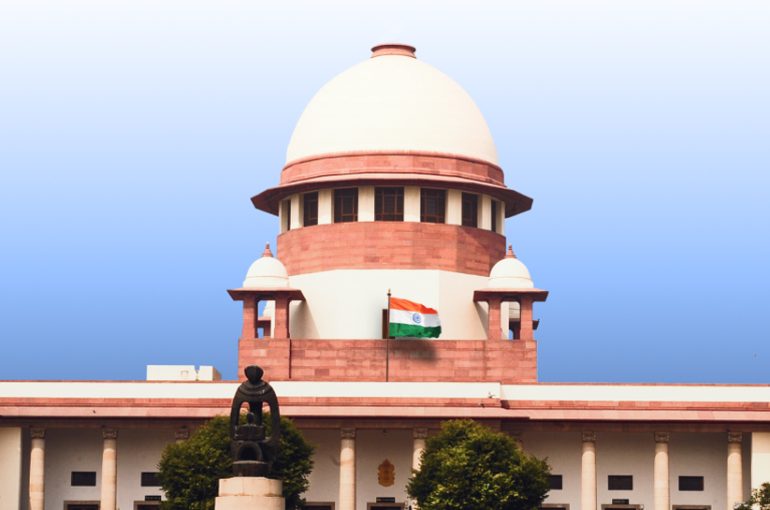SUPREME COURT CLARIFIES COGNIZANCE BAR UNDER SEC. 195, CrPC FOR OFFENCES AGAINST PUBLIC SERVANTS

In a significant judgement in the case of Devendra Kumar v. State (NCT of Delhi) & Anr [SLP (Criminal) No. 12373 of 2025], the Supreme Court of India adjudicated on the scope and application of Section 195 of the Criminal Procedure Code (Cr.P.C.), particularly concerning offences under Section 186 of the Indian Penal Code (“IPC”), i.e., obstructing public servants in discharge of their duties.
The decision, delivered by the division bench of Justices J.B. Pardiwala and R. Mahadevan, provides essential guidance on prosecutorial procedures for offences impacting the authority and functioning of public servants and clarifies several procedural complexities that often arise in practice.
BACKGROUND OF THE CASE
The matter originated from an incident dated 3 October 2013, in which the respondent, a process server employed with the Nazarat Branch, Shahdara, was allegedly obstructed and mistreated by the Petitioner, then serving as a Station House Officer (SHO) at the Nand Nagri police station. The process server had visited the police station to serve warrants and sought acknowledgment for the same. Allegedly, he was verbally abused, compelled to stand with raised hands as punishment, and detained for several hours.
Following the episode, the process server filed a complaint to the District and Sessions Judge, Shahdara, who directed the Administrative Civil Judge to lodge a private complaint under Section 195 Cr.P.C. before the Chief Metropolitan Magistrate (CMM), Karkardooma Courts. The CMM accordingly ordered registration of an FIR under Sections 186 and 341 of IPC, and directed that the investigation be conducted by an officer of the rank of Assistant Commissioner of Police (ACP).
The Petitioner challenged the order before the Sessions Court and subsequently before the High Court of Delhi, arguing a series of procedural and jurisdictional violations including improper invocation of Section 156(3) Cr.P.C., non-compliance with Section 195, and lack of requisite complaint by the competent authority.
COURT’S ANALYSIS AND FINDING
- Necessity of proper complaint under Sec. 195, CrPC: The Supreme Court reiterated the requirement that for offences listed under Sections 172 to 188 IPC, including Section 186, a court cannot take cognizance except upon a written complaint by the concerned public servant or his administrative superior. This provision is designed to prevent frivolous or malicious prosecutions against public officials and to safeguard the administration of justice.
- Scope of Police Investigation: The Court clarified that Section 195 Cr.P.C. operates as a bar only at the stage of the court’s cognizance, not at the stage of police investigation. There is no prohibition against registration of an FIR or police investigation for such offences, however, upon completion of investigation, the embargo on the court’s ability to take cognizance becomes operative.
- Splitting and severance of offences: The judgment discussed in detail when offences arising from a common set of facts can be ‘split up.’ Where multiple offences, including those under Section 195, arise from the same transaction and are integrally related, courts should be careful not to bypass mandatory procedural safeguards. Distinct offences not covered by Section 195 Cr.P.C. may still be prosecuted, provided they are not intrinsically connected in a way that would circumvent the protection of Section 195.
- Incorrect Magistrate procedure criticized: The Supreme Court noted that the CMM should have taken cognizance directly upon the complaint by the Administrative Civil Judge rather than directing police investigation under Section 156(3) Cr.P.C., particularly given the sanctity attached to complaints lodged by judges and the underlying importance of maintaining judicial dignity.
- Interpretation of obstruction: Reviewing jurisprudence, the Court affirmed that ‘obstruction’ under Section 186 IPC is not limited to physical acts but extends to any conduct that unlawfully impedes a public servant, regardless of whether violence or criminal force is involved.
DIRECTIONS OF THE COURT
- The Supreme Court declined to quash the proceedings at this stage, noting that the legal embargo under Section 195 Cr.P.C. would become applicable only when cognizance is sought by the trial court, and that the Petitioner is entitled to raise the bar of Section 195 before the trial court if a chargesheet is eventually filed for such offences.
- The Court ordered that a copy of the judgment be circulated to all High Courts for future guidance.
KEY TAKEAWAYS FROM THE JUDGEMENT
- For offences under Sections 172 to 188 IPC, no court may take cognizance unless a written complaint is filed by the concerned public servant or his administrative superior.
- The procedural bar under Section 195 Cr.P.C. does not prevent police from investigating and registering FIRs, it only restricts the court from taking cognizance in absence of the requisite complaint.
- Courts must exercise caution when deciding whether distinct offences arising from the same set of facts can be prosecuted separately, especially if such actions would undermine mandatory procedural protections.
- Acts amounting to ‘obstruction’ of a public servant include a broad range of conduct, not necessarily involving physical or violent resistance.
CONCLUSION
The Supreme Court’s ruling in this case marks a comprehensive clarification of the procedural framework for prosecuting offences that impinge upon the authority and functions of public servants. By elucidating the interplay between police investigation and the court’s power to take cognizance under Section 195 Cr.P.C., the judgment preserves both the procedural rights of accused persons and the institutional interests of judicial administration. The decision stands as a guide for future cases involving offences against public justice, ensuring fairness and consistency in criminal proceedings.
Soumen Dash
(Legal Associate)
The Indian Lawyer & Allied Services
Please log onto our YouTube channel, The Indian Lawyer Legal Tips, to learn about various aspects of the law. Our latest Video, titled Plane Crash and Legal Liability? Air India Crash in Ahmedabad Explained | Advocate Sushila Ram Varma | can be viewed at the link below:
https://www.youtube.com/watch?v=azYUBkke9jI





































Leave a Reply